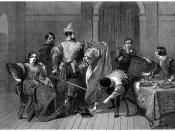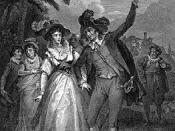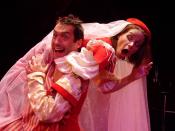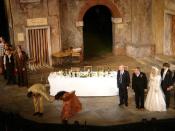The Taming of the Shrew- Analysis of Shakespeare's Handle on Elizabethan Stereotypes Today, when one gazes upon Elizabethan stereotypes they may be offended or disgusted. In the fourteenth century there were guidelines and rules that had to be followed when it came to how a woman should or should not act. There were even some for the men, but women who went against these boundaries were sunned in society as outcasts and tramps. If a woman wasn't a faithful wife or showed true devotion to her husband, she was considered a wanton woman. If she was to be virtuous, she had to be obedient and pure. Shakespeare managed to divulge the cynical comedy in the period's stereotypes when he wrote The Taming of the Shrew.
The likes of Kate and Bianca, were Shakespeare's focal point to show his views of how outlandish he thought of the stereotypes. He purposely exaggerated their stereotypes to show the extremes if the spectrum.
However, at the end of the play he switched their stereotypes to show that stereotypes are interchangeable.
Kate in the beginning was the curse of the town. Kate, "be she as Sibyl, and as curst and shrewd"ÃÂ (I.II.69), nobody wanted to marry her, but rather her fair and virtuous sister, Bianca. Kate was considered a wanton and undesired woman. Her mouth was uncontrollable and it only took a little bit to get her to blow up to say things like: "I' faith, sir, you shall never need to fear: Iwis it is not halfway to her heart.
But if it were, doubt not her care should be To comb your noodle with a three-legged stool.
And paint your face and use you like a fool."àUsing words like that gave Kate the reputation that she did. After Kate and Petruchio get married, Petruchio decided to make Kate a better wife. So he started to tame her. Shakespeare gave this a touch of wit and humor to get his point across to the extreme of how a good wife should be. Petruchio's understanding of how Kate works was used against her as her taming process began. Petruchio did some much outlandish things that Kate begun to see the error in her way. She was "tamed"àby the end of the play. She evolved from the "unquiet woman and wanton woman"àto the "good wife and quiet woman"ÃÂ. Lucentio commented best, "'Tis a wonder"æshe will be tamed so."à(V.II.189) Bianca will not however change much in the course of the play. Shakespeare decided that she should appear to be a quiet good wife, but deep down, she was not as virtuous as she might seem. She plays with Lucentio and Hortensio as they court her in disguise. Shakespeare makes Bianca come off as some pretty little girl who is pure and innocent. While all the while, she isn't at all. Men seem to fall in love easily with the pure woman as did Lucentio when he told Tranio that, "I burn, I pine, I perish"à(I.I.155) at first sight of Bianca.
Shakespeare's humor comes out in the irony of his stereotypes. Each woman is overcome by her own shrewdness from Petruchio that it turns her. Bianca is so overwhelmed by the number of suitors and men after her that she is changed drastically to becoming a wanton woman. By the end of the play each girl has morphed. They have changed in such ways that it is possible that they even might be able to take the other woman's original stereotype, almost. Kate has turned to a "good wife"ÃÂ and Bianca, is not as virtuous as she might of came off as. Shakespeare is trying to provide that even though one may appear to be one way, a stereotype is just a stereotype and is not concrete.
Petruchio's character was used to show the audience the law of stereotypes. His character made sure that Kate, the wanton woman, was turned into the quiet woman and loving wife. He in effect was the law officer that made sure that Kate, was not a woman that was deceptive to her good looks. Is this true how all good husbands should act? Should they be the ones to make their wives virtuous and faithful? Shakespeare hints at it but is never too clear, if it is just a character trait of Petruchio.
Shakespeare gives us good insight on our society. He shows us how ridiculous we can sometimes look. How our stereotypes sometimes backfire on us. Or how we may think one thing about a person but they my actually turn out completely different. Shakespeare laughs at our social mistakes and turns them against us so that we may laugh too. He saw Elizabethan stereotypes as unnecessary and tried to express his views to show the Elizabethan world what they look like. To him, Kate represented all the bad wanton women in the world and he was Petruchio. He, through The Taming of the Shrew, was trying to tame them and get them to see their follies. Shakespeare saw things that nobody else saw, he saw the come




